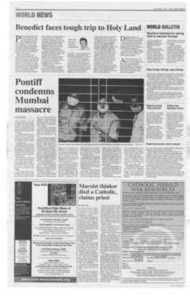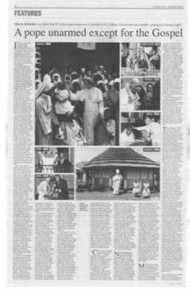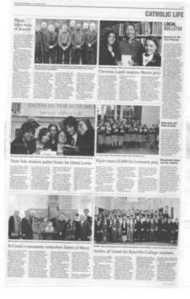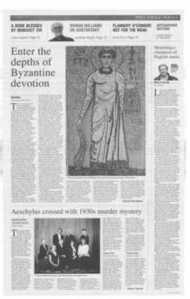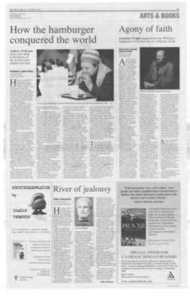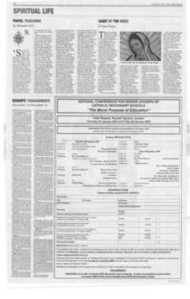Page 15, 5th December 2008
Page 15

Report an error
Noticed an error on this page?If you've noticed an error in this article please click here to report it.
Tags
Share
Related articles
Television
Interfaith Honour For Margaret Thatcher
Cardinal Backs Family Breaks
Religion Is An Ally Of Pluralism, Says Rowan Williams
Hope Without Illusion
Agony of faith
Jonathan Wright applauds Rowan Williams's reappraisal of Dostoevsky as a religious writer
Dostoevsky: language, faith and fiction
BY ROWAN WILLIAMS CONTINUUM £18.99
As befits an archbishop, Rowan Williams begins his new book with a touch of sermonising. He is clearly irritated by "the current rash of books hostile to religious faith", that "treat religious belief almost as a solitary aberration in a field of human rationality". He wants the authors of such tomes to ponder the sophisticated "systems of meaning" provided by religion, to look more closely at what "the language of a particular religious tradition allows its believers to see", and to abandon the notion that "there is one basic and obvious way of seeing the world which any fool can get hold of'. Quite right too. Instead of launching their theologically ill-informed rants, it would be a boon if the more truculent delusionweavers ditched their stereotypes and their talk of feeble-minded believers and spent more time considering what "religious people actually do and say". After all, one doesn't have to worship a God in order to take religion seriously. Williams suggests that an ideal starting point would be to "track the ways in which a distinctively Christian imagination" has produced some of the world's greatest cultural and artistic achievements. But who should we use as a case study? Apparently, Dostoevsky is the perfect candidate. This is, to say the least, a bold choice.
The wonderful thing about Dostoevsky's novels is the lack of certitude, the absence of happy endings, the mess and muddle of it all. Readers are left asking questions. Everything. says . Williams, seems to be "left painfully and shockingly open". As Williams continues, this has led many writers and critics to adopt Dostoevsky as the poster boy of angst-ridden agnosticism. hovering between religious belief and disbelief. In fact, according to Williams, Dostoevsky's religious faith was one of the central planks of his artistic achievement. It wasn't a cosy sort of faith, by any means. For Dostoevsky, theology wasn't so much about basic issues such as whether God existed: it was about the nitty-gritty of God's relationship with humanity. In this contested arena, everything was open for debate, glib certainties had no place, and theology was an organic endeavour. Every theological thought was open to criticism: it had to "issue into a Linguistic world where it may be contradicted, ignored, parodied or trivialised". This is why Dostoevsky's characters are often so inconsistent, so eager to explore different moral options. In fact, Williams claims, it makes sense to talk of Dostoevsky's "theology of writing". His books had do choice but to be inconclusive and open-ended. But does that mean they lack a moral core? Not at all, says Williams. Horrible things happen, the books are the Devil's playground, but perhaps this is all intended to raise the questions of "what else might be possible if we characters and readers saw the world in another light, the light provided by faith". Is this being too kind to Dostoevsky: in the sense of crediting him with a consistent. systematic artis tic vision? I think it probably is, but Williams works extremely hard to make his case. Those familiar with the novels will relish many of Williams's close readings, his interrogations of central Dostoevskian themes like freedom and the Devil, and his attempt to stress the specifically Orthodox context of Dostoevsky's Christianity. The world of the Orthodox Church is something of a given in the novels lots of monasteries, rites and icons but Williams lends his weight to a growing scholarly effort to dig a little deeper: to see how the motifs and ideas of Orthodoxy (most especially the issue of holy images) influenced Dostoevsky's writing. This is fertile terrain.
0, is an examination of Dostoevsky's works a good way to convince the gaittsayers that Christian thinkers can be sophisticated, rational and important? Absolutely. Not least because Dostoevsky's Christianity was so fluid and so agonised. As Williams reminds us, late in life Dostoevsky declared that "it is not as a child that I believe in Christ and confess him. My hosanna has passed through a great crucible of doubt."
It would be nice if more Christians' hosannas derived from this fumbling sense of humility and
uncertainty.
blog comments powered by Disqus





